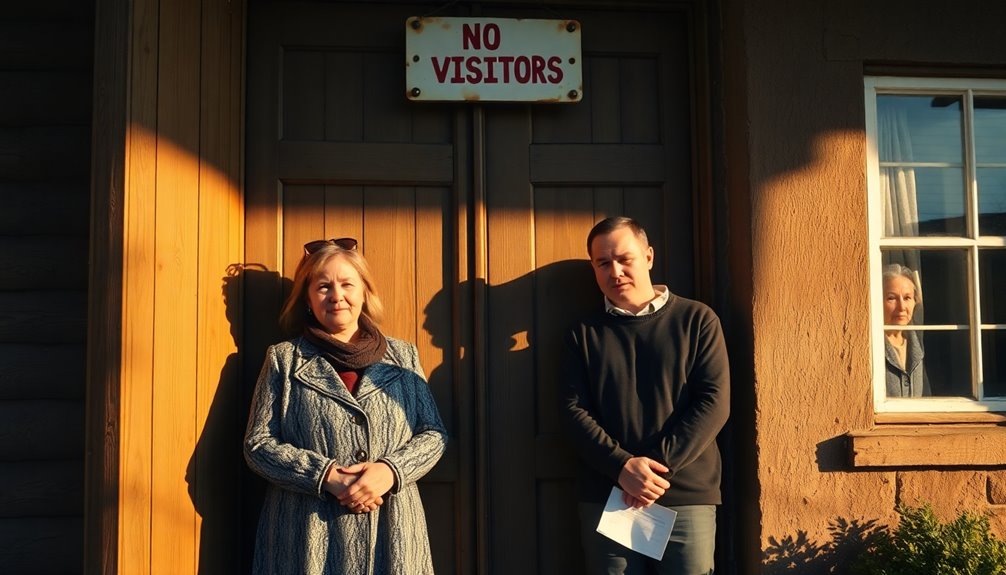If you and your siblings are locked out of visiting your elderly parent, it's vital to understand your legal rights. Filial responsibility laws may require adult children to support their parents. Watch for signs of control, like restricted communication or unusual visitation rules. Seek legal assistance if you're facing difficulties. Open communication with family can help prevent misunderstandings. Knowing how to report suspected abuse is essential too. Keep learning about your options and empowerment in this situation.
Key Takeaways
- Document any unusual visitation rules and communication restrictions to establish a pattern of control over your parent.
- Consult with an elder law attorney to understand your legal rights and options regarding visitation.
- Report suspected abuse or neglect to Adult Protective Services or local law enforcement for immediate intervention.
- Engage in open dialogue with family members to address concerns and advocate for your parent's autonomy.
- Consider involving a mediator or family therapist to facilitate discussions and resolve conflicts regarding visitation.
Understanding Your Legal Rights as a Family Member

When you're advocating for your elderly parents, it's crucial to understand your legal rights as a family member. Filial responsibility laws may require you to provide financial support if your parents can't manage on their own. These laws can be enforced if the parent is in need and the adult child is financially able to help. Additionally, understanding the divorce process in Berlin can be important if any family disputes arise that affect your parents' welfare. California's Elder Abuse and Dependent Adult Civil Protection Act offers protections against neglect and abuse, ensuring their safety. Familiarize yourself with the Nursing Home Reform Act, which secures your parents' rights to make informed medical choices. Additionally, you might need to consider powers of attorney for healthcare and finances to safeguard their interests. Remember, if you suspect any abuse, don't hesitate to report it to authorities. Understanding these rights empowers you to advocate effectively for your loved ones.
Recognizing Signs of Restriction and Control

Understanding your legal rights as a family member sets the stage for recognizing potential signs of restriction and control over your elderly parents.
Look out for unusual visitation rules that require permission or impose strict schedules. If you notice limited access to your parent or that visits are supervised, this could indicate control. In some cases, these restrictions may stem from financial misconduct that influences family dynamics.
Pay attention to any exclusion of family members, like grandchildren, from visits. Frequent changes in visitation rules can create unnecessary stress.
Additionally, observe how communication is managed; if it's tightly controlled, that's a red flag. Monitoring for signs of self-neglect or abuse can help you identify if your parent is under undue influence.
Watch for signs of emotional manipulation, physical barriers, or threats regarding visitation.
Lastly, be aware of changes in your parent's appearance or behavior, as these can signal neglect or undue influence.
Seeking Legal Assistance for Your Situation

If you're facing challenges in visiting your elderly parents, seeking legal assistance can be a vital step toward ensuring their well-being and your rights.
Start by exploring resources like Legal Aid of North Carolina, which offers free help to seniors regarding public benefits and abuse cases. You can also locate specialized elder law attorneys through the National Academy of Elder Law Attorneys (NAELA). Many states have local bar associations and Area Agencies on Aging that provide legal support. For urgent concerns, check out dedicated hotlines like Pennsylvania's Senior Law Helpline. Additionally, consider reaching out to the Senior Law Project, which provides free civil legal help to North Carolinians aged 60 and older. It's essential to recognize the importance of open communication to ensure that your elderly parent's needs and wishes are respected during this process.
Strategies for Maintaining Family Communication

Navigating the challenges of visiting elderly parents often requires open lines of communication among family members. Use direct and transparent dialogue to prevent misunderstandings and ensure everyone's on the same page. Show empathy by actively listening to each other's concerns and validating feelings. Nonverbal cues like body language can enhance understanding, so pay attention to those signals.
Hold family meetings to discuss care needs, allowing everyone to voice their opinions. Encourage face-to-face interactions whenever possible, and involve your elderly parent in decision-making to respect their autonomy. Involving aging parents in decision-making empowers them and helps maintain their control over their care.
If necessary, provide written instructions to help with memory retention. By fostering a supportive environment, you can maintain strong family communication while navigating these difficult times.
Preventing Future Conflicts With Open Dialogue

While disagreements are natural in family dynamics, fostering open dialogue can significantly reduce the likelihood of future conflicts.
Establish regular family meetings to identify shared goals and values, promoting understanding and empathy. Encourage everyone to express concerns without judgment, validating emotions to facilitate constructive discussions. Incorporating effective communication strategies can further enhance these meetings by ensuring clarity and purpose.
Active listening is essential; it ensures every family member feels heard and valued. Use feedback sessions to adjust roles and responsibilities as needed, addressing fears and uncovering underlying issues.
Developing a clear, written caregiving plan with defined roles and responsibilities helps eliminate ambiguity. Effective communication is crucial for conflict resolution, and regularly reviewing this plan for effectiveness and adaptability involves all family members in the process to strengthen unity and commitment to your elderly parent's well-being.
Reporting Elder Abuse and Seeking Help

Elder abuse can happen in various forms, and recognizing it's the first step toward protecting your loved ones.
If you suspect abuse, report it immediately through Adult Protective Services (APS), local law enforcement, or elder abuse hotlines. You can often do this anonymously, which helps protect you from retaliation. Legal protections exist for good-faith reporters in many states, ensuring that those who speak out can do so without fear of consequences.
Remember, psychological abuse, like frequent yelling, qualifies as elder abuse too. Seeking legal assistance from an attorney can guide you through the reporting process and explain state-specific laws.
Keep records of incidents to support your claims, and consider involving local ombudsmen who advocate for the elderly.
Your priority should be the safety and well-being of your loved one—take action now to ensure they receive the care they deserve.
Frequently Asked Questions
Can a Sibling Refuse to Let Me Speak With Our Elderly Parent?
Yes, a sibling can refuse to let you speak with your elderly parent, especially if they hold power of attorney or believe it's in the parent's best interest.
However, it's crucial to communicate openly with your sibling about your concerns and feelings.
If necessary, consider seeking mediation or legal advice to address the situation.
What if the Elderly Parent Prefers One Sibling Over the Others?
Did you know that nearly 65% of families experience some level of parental favoritism?
If your elderly parent prefers one sibling, it can create tension. You might feel overlooked or undervalued, which can strain your relationship.
Open communication with your parent and siblings is key. Try discussing feelings honestly, and consider mediating any conflicts.
Recognizing your parent’s choices while balancing caregiving responsibilities can help ease the emotional burden on everyone involved. It’s important to understand that their decisions stem from a lifetime of experiences and values. By fostering open communication and empathy, you can create a supportive environment that respects their independence while also addressing your caregiving responsibilities. Additionally, discussing topics like the benefits of owning a home can not only provide practical insights but also reinforce the emotional security that comes with being part of a stable living situation.
How Can I Document My Visits to the Elderly Parent?
To document your visits to your elderly parent, start by keeping a logbook where you record each visit's date and time.
Note any observations about their condition or behavior, and write down conversations you have.
You might also list activities you do together and attach photos to provide a visual record.
Using mobile apps or digital notebooks can help you stay organized and ensure your documentation is easily accessible.
Are There Specific Laws About Visitation Rights in My State?
So, you think your state's laws on visitation rights are crystal clear? Think again! They vary wildly.
Some states grant you express rights, while others require guardians to seek court orders to keep you away. You might need to roll up your sleeves and check your state's specific laws, especially if you're facing a stubborn guardian.
What Role Do Caregivers Play in Restricting Visits to the Elderly?
Caregivers can significantly influence visitations for elderly individuals. They often manage interactions, deciding who can visit based on their assessment of the situation.
This can lead to emotional manipulation, making it harder for you and others to connect with your loved one. Sometimes, caregivers restrict visits to cope with their own stress or burnout.
It's essential to recognize their role and communicate openly to navigate these challenges effectively.
Conclusion
Just like a tree needs sunlight and water to thrive, your family needs open communication and understanding. If you find yourself locked out from visiting your elderly parent, remember that you hold the key to change. Stand firm, seek the support you need, and nurture the roots of your family ties. Together, you can break down barriers, ensuring that love and connection flourish, just as a tree grows stronger with every season. Don't let anyone dim your family's light.
References
- https://www.agingcare.com/questions/who-has-more-rights-to-the-care-of-an-elderly-person-the-persons-children-or-the-persons-siblings-479623.htm
- https://www.cag.edu.tr/uploads/site/lecturer-files/387-2-english-vocabulary-in-use-pre-intermediate-and-intermediate-redman-2017-4th-264p-sayfalar-silindi-3br9.pdf
- https://www.trust-lawgroup.com/what-to-do-if-a-sibling-keeps-you-away-from-your-elderly-parents/
- https://wac.colostate.edu/docs/books/writingspaces1/writing-spaces-readings-on-writing-vol-1.pdf
- https://www.rossandshoalmire.com/faqs/texas-elder-law-guardianship-and-visitation-rights.cfm
- https://careindeed.com/blogs/legal-responsibility-for-your-parents-in-california
- https://www.griswoldcare.com/blog/protecting-elderly-parents-from-siblings/
- https://gharibianlaw.com/basic-legal-rights-for-california-elders/
- https://www.agingcare.com/questions/child-prevented-from-visiting-elderly-parent-154993.htm
- https://www.americanbar.org/news/abanews/publications/youraba/2017/april-2017/a-10-step-legal-checklist-for-caregivers-/









